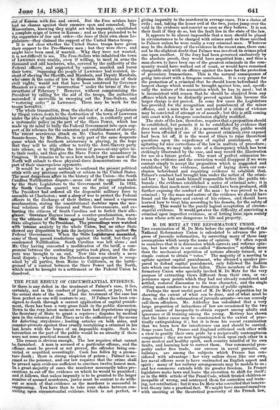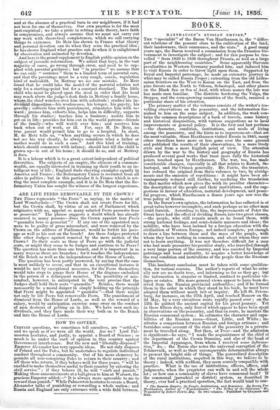M. DE METZ AT THE REFORMATORY UNION.
Tire examination of M. De Metz before the special ineeting of the National Reformatory Union is calculated to advance the pro- gress of juvenile reformation, by correcting may of those easy assumptions which usurp the name of opinion. We often repeat to ourselves that it is discussion which corrects and reforms opin- ion, but how often is our so-called "discussion" nothing more than the mechanical repetition of notions already formed, or a simple contest to obtain votes." The majority of a meeting to agitate against capital punishment, who silenced a speaker pre- pared to defend capital punishment, only follOwed the fashion into which our discussion has fallen. Those members of the Re- formatory Union who specially invited M. Di Metz for the very- purpose of extracting views different from their own, or ex- periences upon points which they had not already considered and settled, restored discussion to its true diameter, and the single sitting must conduce to a true formation 'of public opinion. Perhaps the most useful part of M. De Metz's exposition lay in showing the extent of what can be done, and of what must be done, to effect the reformation ofjuvenile errants—we can scarcely call them offenders. Mr. Adderley has calculated that a very large proportion of infractions of law are occasioned by the two grand causes of incapacity to obtain support among adults and ignorance or ill training among the young. Mettray has shown that the latter cause may be counteracted to the extent of prac- tically extinguishing it ; but it is from his recent examination that we learn how far interference can and should be earned. Some years back, France and England criticized each other with a view to gratify their own pride by a reciprocally contemptuous comparison ; they are now beginning to look upon each other in a more modest and healthy spirit, each country mindful of its own faults, and learning how to correct them. Our commercial pros- perity under free trade, our success in naval pursuits, our railways, are among the subjects which France has con- sidered with advantage : her 'very sailors dress like our own, her naval officers seem to have contracted an English aspect and
spirit ; many of her railway arrangements may be models to us ; and her commerce extends with its greater freedom. In France legislators make laws and leave the execution to shift for itself ; as in the 66th article of the Penal Code, which treated children as incapable of wrong, and sentenced them for correction and train- ing, not retribution ; but it was De Metz whO converted that benevo- lent theory into a practical fact. 'We might have amused ourselves with sneering at the theoretical generosity of the French law, and at the absence of a practical turn in our neighbours, if it had not been for one of themselves. Our own practice is for the most part empirical ; we take a pride in setting aside theory, have faith in compromises, and always assume that we mast not carry out any work with theoretical completeness, which we call carrying things to extremes. De Metz has shown to France what theory and personal devotion can do when they seize the practical idea ; he has shown England what practice can do when it is enlightened by observation and animat.ed by devotion.
And here is the grand supplement to English public opinion on the subject of juvenile reformation. We admit that boys, in the vast majority of cases, go wrong through error, and need to be sup- plied with parental guidance ; but ".in practice" we assume that we can only " sentence " them to a limited term of parental care, and that the parentage must be a very rough, coarse, regulation kind of makeshift. In Mettray we see our mistake. De Metz found that he could take the model of the parental relation not only for a starting-point but for a constant standard. The little child who must be placed upon the stool in order that his head may reach above the judge's desk finds in Mettray a family home, where the chief watches over him with solicitude ; studies his in- dividual disposition—his weaknesses, his temper, his gayety, his gravity ; corrects him with punishment, stimulates him with re- ward ; praises him, exhorts him, helps him in difficulty, supports through his studies ; teaches him a business ; assists him to get on in life ; provides for him out in the world patrons—friends of the family—who will watch over him ; and receives him back when out of work, or ill. For, says M. De Metz, no tree parent would permit him to go to a hospital. In short, M. de Metz tells us, "when anything occurs in which he does 'not see his way clearly, he always considers what a father or mother would do in such a ease." And this kind of training, which should commence with infancy, should last till the child is grown up—is out of his teens ; it should do so, and at Mettray at does.
It is a labour which is to a great extent independent of political diversities. The subjects of an empire, the citizens of a common- wealth, are equally interested in training up their youth to an in- telligent way of life ; England finds cheering examples equally in America and France ; the Reformatory Union is recruited from all sides in politics; but in this particular it is France which is set- ting the most complete example, and it is in De Metz that the Re- formatory Union has sought the witness of the longest experience.



























 Previous page
Previous page